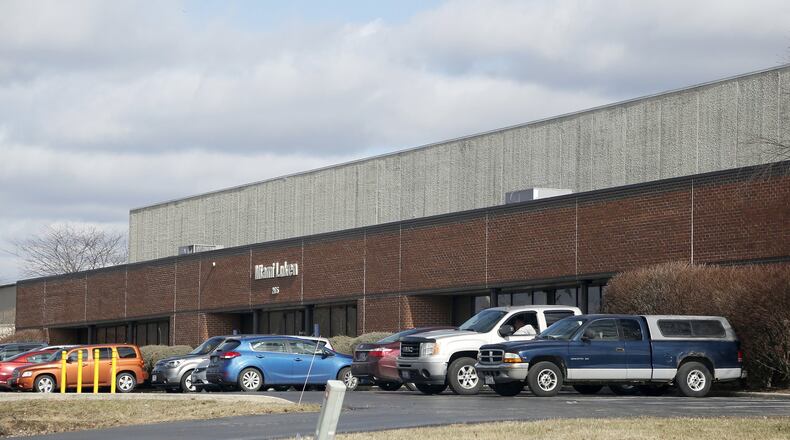Committee documents published Dec. 19 state the company said in October that it had discontinued operations altogether.
Richard Blake, Miami-Luken’s attorney with McDonald Hopkins, said Monday the company “is still winding down.”
Blake said Miami-Luken has stopped distributing controlled substances.
MORE ON MIAMI-LUKEN
• Did drug distributors contribute to opioid crisis? Yes, says Miami-Luken exec.
• Congress continues investigation into Springboro pharmacy distributor
• Why Springboro drug distributor is under fed scrutiny
The committee reported that it received a letter from Miami-Luken's legal counsel said that the distributor had to shut its doors as a result of the DEA proceedings and multiple lawsuits that have been filed against the company. In February 2016, Miami-Luken settled for $2.5 million with West Virginia's attorney general over allegations of flooding the state with painkillers.
A Dayton Daily News reporter had stopped by Miami-Luken’s Springboro facility in October, where staff declined to comment on reports it was going out of business. Messages also were left at the time with the firm’s attorney.
Miami-Luken is required to file a notification with the State of Ohio Board of Pharmacy if it is discontinuing business and give a proposed date of discontinuation. In November, the board told the Dayton Daily News it had not received a notice from Miami-Luken.
| Miami-Luken shipments | |||
|---|---|---|---|
| The distributor shipped millions of Oxycodone and Hydrocodone pills to West Virginia pharmacies. | |||
| Pharmacy | Town population | Years | Total pills |
| Tug Valley | 3,191 | 2008-2015 | 6.4 million |
| Westside Pharmacy | 1,394 | 2008-2015 | 4.4 million |
| Colony Drug | 17,614 | 2005-2015 | 7 million |
| Sav-Rite No. 1 | 406 | 2005-2011 | 599,400 |
| Sav-Rite No. 2 | 406 | 2005-2011 | 5.7 million |
| Source: U.S. House Energy and Commerce Committee |
The Springboro company had a net revenue of $165 million in fiscal year 2015, according to the report.
The report from Congress summarizes findings from an 18-month investigation by the U.S. House Energy and Commerce Committee oversight panel into several pharmaceutical distributors. This includes not only Miami-Luken but also Cardinal Health, AmerisourceBergen, and McKesson, known as the “big three” distributors, as well as the former president and CEO of H.D. Smith, a distributor that sold in January to AmerisourceBergen.
The opioid crisis — which led to more than 42,000 U.S. overdose deaths in 2016 — has its roots in the misuse of prescription opioid painkillers, prompting scrutiny of the entire pipeline from prescribers, to pharmacies, to distributors to drug manufacturers.
MORE: Congress investigating local drug distributor
Distributors such as Miami-Luken buy drugs from pharmaceutical companies and distribute them to pharmacies. The DEA and lawsuits contend the distributors sold higher volumes of painkillers than could be safely used, when instead the companies had an obligation to report suspicious orders.
Distributors have previously noted that they don’t market or make painkillers, and they were filling orders made by a prescriber.
A case study in the new report by the oversight committee said between 2009 and 2015, Miami-Luken shipped more than 4.38 million doses of hydrocodone and oxycodone to Westside Pharmacy. Westside is in a town with a population of 1,394 people as of 2010.
The company ended its relationship with the pharmacy in December 2015, after the DEA started proceedings to take away its license to distribute. The federal report claims Miami-Luken had enough information to take action before the DEA probe.
The pharmacy was selling opioids prescribed by a doctor a four hour round trip away in Virginia and 11.5 hours round trip away in Washington D.C.
RELATED: Local people share their addiction recovery stories
A 2011 report from Westside to Miami-Luken also showed a “significant number” of cash payments for opioids prescribed by these doctors. The DEA has identified cash payments for prescriptions and prescriptions written by physicians located significant distances from the pharmacy as signs of painkillers being diverted for illicit use.
“Despite receiving notice of these red flags, Miami-Luken continued supplying Westside Pharmacy with controlled substances while simultaneously failing to report any of the pharmacy’s orders to the DEA as being suspicious,” the report stated.
Miami-Luken continued to supply Westside Pharmacy for the next four years. In this time, the pharmacy received more than 3.36 million opioids from the company, according to the report.
Miami-Luken’s May 2015 analysis of Westside Pharmacy’s dispensing data showed that three doctors wrote 74 percent of the oxycodone prescriptions filled by the pharmacy between February 2015 and April 2015. Following the company’s analysis, the pharmacy pledged it would no longer fill prescriptions written by several doctors it had identified.
But in October, after learning the pharmacy was still filling prescriptions by two of the doctors, it did not immediately make any changes, the report states. In November 2015, Miami-Luken approved an increase to Westside Pharmacy’s oxycodone threshold.
About the Author
